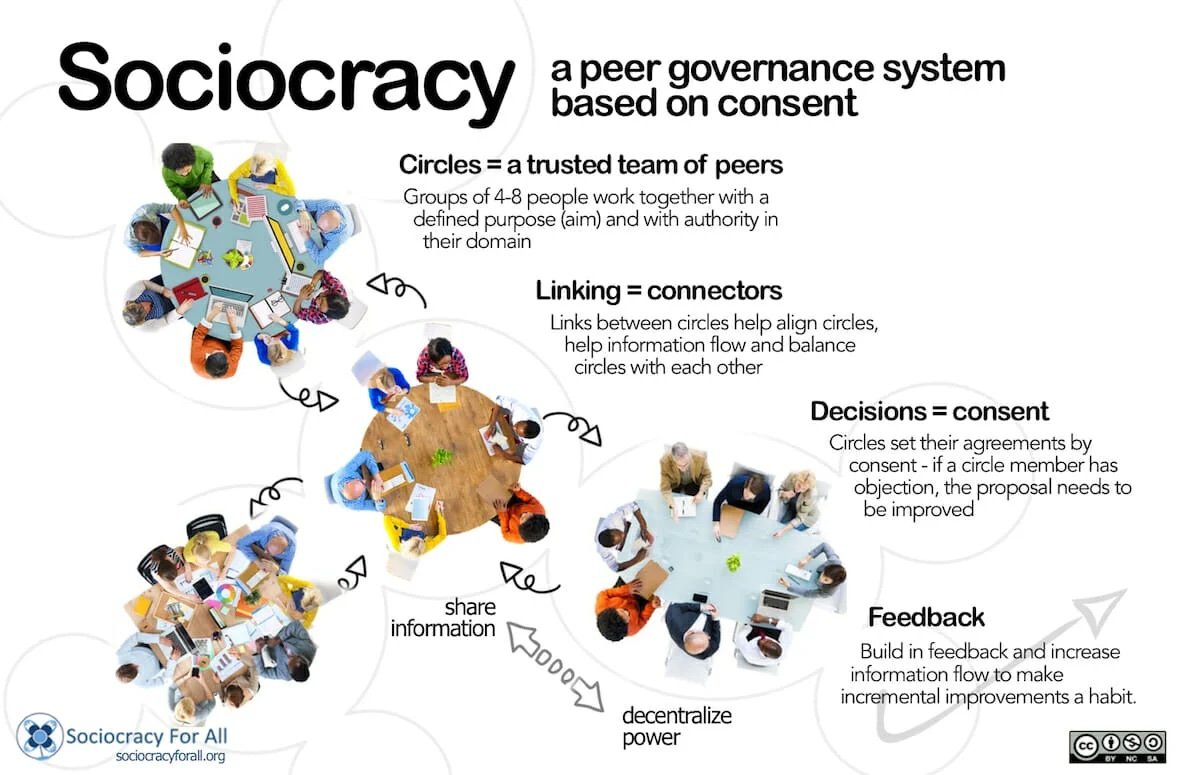
Sociocratic Governance
Sociocratic governance, also known as sociocracy or dynamic governance, is a system of governance and decision-making that emphasizes collaboration, consent, and distributed authority within organizations. Developed by Dutch engineer Gerard Endenburg in the 1970s, sociocracy aims to create more inclusive and effective decision-making processes that empower all members of an organization.
At the heart of sociocratic governance is the concept of "consent decision-making." In contrast to traditional democratic decision-making, which often relies on majority rule, consent decision-making seeks to ensure that decisions are made with the general agreement and consent of all stakeholders involved. This means that decisions move forward unless there are reasoned objections from individuals with relevant expertise or concerns…

Reciprocal Frame Roofs
Reciprocal frame roofs are a type of structural framework used in construction, particularly for roofs, that relies on a self-supporting arrangement of beams or members to distribute loads and create a strong, stable structure. In a reciprocal frame roof, each beam supports the next beam in the sequence, and the load is distributed evenly throughout the structure without the need for internal supports or external bracing.
The basic concept of a reciprocal frame roof involves a series of beams arranged in a circular or polygonal pattern. Each beam rests on and is supported by the beam preceding it, creating a continuous loop of support. The unique geometry of reciprocal frame roofs allows them to distribute loads efficiently and effectively, making them well-suited for spanning large distances without the need for additional support columns or walls…

Nature connection
Nature connection refers to the deep and meaningful relationship that individuals develop with the natural world. It encompasses a sense of awe, reverence, and appreciation for the beauty and complexity of nature, as well as a recognition of our interconnectedness with all living beings and ecosystems. Nature connection involves not only spending time outdoors but also engaging with the natural world in a mindful and intentional way, fostering a sense of belonging and stewardship…

The Way of Council
The Way of Council is a communication practice rooted in indigenous traditions and modern group facilitation methods. It emphasizes deep listening, authentic sharing, and communal dialogue to foster connection, understanding, and collective wisdom within a group. Council circles typically involve participants sitting in a circle, passing a talking piece (an object that symbolizes the right to speak), and speaking from the heart without interruption or judgment.

Natural Building
Natural building uses locally-sourced, renewable, and minimally-processed materials to create structures that are harmonious with the environment and healthful for occupants.
This method of construction emphasises sustainability, affordability, and energy efficiency, drawing inspiration from traditional building techniques and indigenous knowledge.
Common materials used in natural building include earth (such as cob, adobe, and rammed earth), wood, straw, stone, and clay. These materials offer benefits such as thermal mass, breathability, and low embodied energy, making natural buildings comfortable to inhabit and environmentally friendly…

Deep Ecology
Deep ecology is a philosophical and ecological perspective that emphasises the intrinsic value of all living beings and the interconnectedness of the natural world. It was coined by the Norwegian philosopher Arne Naess in the 1970s as a response to what he saw as shallow environmentalism, which focused primarily on human-centric concerns like pollution and resource depletion. Deep ecology proposes a radical shift in consciousness, urging individuals to recognise their place within the broader web of life and to cultivate a deep sense of empathy and respect for all beings…

Permaculture Design
Permaculture design is a core element of land-based living, offering a holistic approach to harmonising human habitation with the natural world.
Rooted in principles of observation, mimicry of natural systems, and the wise use of resources, permaculture design seeks to create resilient ecosystems that support human needs while enhancing biodiversity and ecological health.
At its core, permaculture embodies a profound reverence for the land, advocating for a deep connection with nature and a commitment to the principles of deep ecology…